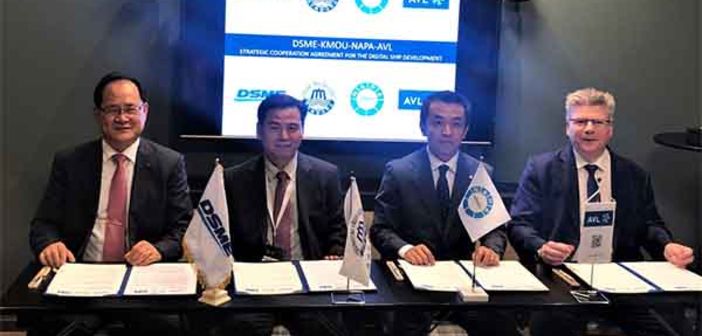Daewoo Shipbuilding & Marine Engineering (DSME), Korea Maritime and Ocean University (KMOU), NAPA and AVL have announced a strategic cooperation agreement to develop digital ships and related strategic solutions. The agreement will combine the four parties expertise in naval architecture and shipbuilding, engines, big data, and software development to develop new solutions that combine all of these elements. The collaboration will cover all aspects of creating digital twins; from the acquisition and processing of quality engine room data, ship performance and meteorological data to the training, simulation and human machine interface required to turn insights from engine data into practical efficiencies. Each partner will bring a different angle to the collaboration, coordinated by DSME. KMOU will focus on providing knowledge-based platforms in the fields of simulations and communications related to digital ships, extending to AR/VR; NAPA will develop digital twin ship models with digitalized components and a real-time simulation platform to integrate between engine models and ship models; and AVL will develop the simulation tools and methodologies that the partnership projects will require. Odin Kwon, CTO of DSME, said: The development of the digital twin ship and engine is one of the most exciting outcomes of the recent surge in maritime digitalization and development of the Internet of Things. By creating a virtual, real-time copy of engine equipment, we can better monitor, analyze, and predict performance, leading to safer and more efficient operations. “Digital twins bring together a range of different fields of expertise, requiring hardware, software and operations to work together, Kwon continued. This is why collaboration is essential if this technology is to mature. This partnership represents shippings best minds in shipbuilding, engines, ship operations, and software. Were excited to work together to develop digital twin technology and a platform that will make future generations of ships safer and smarter.
Industry and academia partner to develop digital twins of ships and engines

Previous ArticleCountdown to Electric & Hybrid Marine World Expo 2019
Next Article UK to insist on zero emissions ships from 2025


